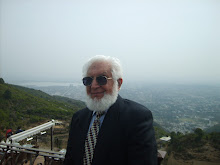I wrote "Rooh" and not "Soul" because the word Rooh is slightly better understood by Muslims
The other reason is that in English sometimes "soul" can be used for persons like "I did not see a single soul in the ground" meaning a human being or a person
But Rooh is not used in this manner but always in the manner of the 'spirit' which again in English can be used with a different meaning so I did not say spirit either.
Rooh is a non-corporeal or ethereal thing which is easier to understand but difficult to define. For discussion we will confine ourselves to Human soul. In the same way we are quite familiar with 'life' and 'death' but defining these is not as simple We know that when a person dies his/her rooh leaves the body and that is the teaching in all religions. Philosophy came to similar conclusions and science has nothing else to offer.
We can say that there are two sources of human knowledge:
One: Intelligence or Aql given to us by our Creator that we use both for philosophy as well as scientific study consisting of Observation, Experimentations and Conclusion/derivation. Thomas Aquinas calls this "natural revelation" as compared to the revelation from God that we call scripture. and so the second: is Revelation. Since we cannot observe or experiment on such ethereal substance we must depend upon God's revelation to determine the truth about rooh/soul. Most religions teach that Rooh is not destructible.
Islamic perspective:
Further knowledge about Rooh in Islam is based on Qur'an and Saheeh Ahadeeth. I frequently quote the Verse "They ask thee concerning the 'Rooh', Say, the Rooh comes from the command of my Lord; it is only a little of knowledge, that is given to you (O men)" (#85 of Sura Bani Israeel ). I feel as though here The Creator is telling us about rooh and saying that you cant have any more knowledge about it (That is not what most mufassireen say, that is only my feeling) From Saheeh Ahadeeth we learn:
That 'rooh' enters the body (by the command of Allah) at a particular time while body of human being is acquiring shape in the womb of the mother and it leaves the body (by the command of Allah) at the time of death. There is also some knowledge as to what happens to it after it leaves the body. Qur'an tells us it also leaves the body during sleep (Verse 42 of sura Zumur the 39th Sura) but still maintains a connection with the body but that connection is permanently lost at the time of death.
After death (of the body) Rooh enters into a state of "in between" called Berzakh in Arabic (where it can meet with other "arwaah"[plural of rooh) and will reunite with the body (may be in a different way?) at the time of resurrection (al-Quiyamah).
Please visit my Urdu blog at خیالات و احساسات
The other reason is that in English sometimes "soul" can be used for persons like "I did not see a single soul in the ground" meaning a human being or a person
But Rooh is not used in this manner but always in the manner of the 'spirit' which again in English can be used with a different meaning so I did not say spirit either.
Rooh is a non-corporeal or ethereal thing which is easier to understand but difficult to define. For discussion we will confine ourselves to Human soul. In the same way we are quite familiar with 'life' and 'death' but defining these is not as simple We know that when a person dies his/her rooh leaves the body and that is the teaching in all religions. Philosophy came to similar conclusions and science has nothing else to offer.
We can say that there are two sources of human knowledge:
One: Intelligence or Aql given to us by our Creator that we use both for philosophy as well as scientific study consisting of Observation, Experimentations and Conclusion/derivation. Thomas Aquinas calls this "natural revelation" as compared to the revelation from God that we call scripture. and so the second: is Revelation. Since we cannot observe or experiment on such ethereal substance we must depend upon God's revelation to determine the truth about rooh/soul. Most religions teach that Rooh is not destructible.
Islamic perspective:
Further knowledge about Rooh in Islam is based on Qur'an and Saheeh Ahadeeth. I frequently quote the Verse "They ask thee concerning the 'Rooh', Say, the Rooh comes from the command of my Lord; it is only a little of knowledge, that is given to you (O men)" (#85 of Sura Bani Israeel ). I feel as though here The Creator is telling us about rooh and saying that you cant have any more knowledge about it (That is not what most mufassireen say, that is only my feeling) From Saheeh Ahadeeth we learn:
That 'rooh' enters the body (by the command of Allah) at a particular time while body of human being is acquiring shape in the womb of the mother and it leaves the body (by the command of Allah) at the time of death. There is also some knowledge as to what happens to it after it leaves the body. Qur'an tells us it also leaves the body during sleep (Verse 42 of sura Zumur the 39th Sura) but still maintains a connection with the body but that connection is permanently lost at the time of death.
After death (of the body) Rooh enters into a state of "in between" called Berzakh in Arabic (where it can meet with other "arwaah"[plural of rooh) and will reunite with the body (may be in a different way?) at the time of resurrection (al-Quiyamah).
Please visit my Urdu blog at خیالات و احساسات

No comments:
Post a Comment